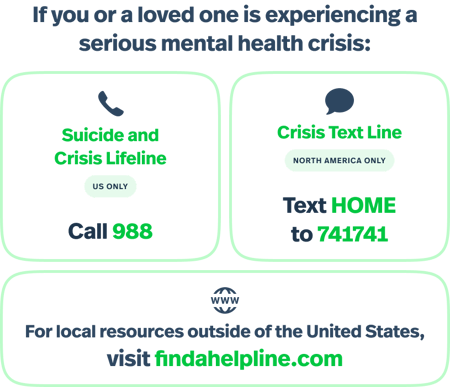Start Moving Forward ⏩
Existential depression is on the rise—more and more people are feeling "stuck" in life. We've compiled these resources to help you understand it and move forward.

"In my experience as a psychiatrist, about 1/3 of patients who are depressed will benefit substantially from an anti-depressant medication. The problem is that for [the rest] it won't help very much because the origin of their depression is different."
- Dr. K
What is existential depression?
There are essentially two reasons for depression. On the one hand, depression is caused by a malfunction of the mind—either a chemical imbalance, or cognitive distortion. In this case, medication and cognitive behavioral therapy (CBT) can be implemented to "fix" and manage the depression.
The other reason is what we refer to as existential depression, and it has more to do with how the world is becoming increasingly uncertain. People who experience this form of depression are looking at the state of the world and making a genuine, objective assessment of their future and discovering that things are not hopeful in a logical sense.
Congruent depression aligns with existential depression in that it is appropriate for your circumstances as opposed to a malfunction of the mind. It's typically caused by a genuine lack of purpose or feeling like your life is missing something important.
Think you're experiencing some form of Existential Depression?
Coaching can help you identify what's holding you back, so you can find a path forward.

"As a human being, there are three fundamental pieces of your existence—thoughts, emotions, and action. What we notice about people who are existentially depressed is that there is an imbalance between these."
- Dr. K
Characteristics of Existential Depression


"Existential depression is skyrocketing [...] The bigger problem is that our [standard] treatments of depression don't appear to be working."
- Dr. K
Existential Depression Requires Existential Solutions

"People are struggling to find meaning in life. I had a choice between opening a clinic and developing a Coaching program. I chose the Coaching program because it's better suited to help people with transdiagnostic factors like, perfectionism, ego, identity issues, purpose, meaning."
- Dr. K
How HG Coaching Can Help
Personal Development
Professional Growth
Empowerment & Fulfillment
*Compared to where they were when they started Coaching
FAQs
How do I break free from depression?
Depression is complex and can be caused by a number of issues, including mental illness, trauma, anxiety, and much more. The first step is identifying where your depression comes from, so you can take the right steps in fixing it or moving past it.
Dr. K's Guide to Mental Health is a great resources to help you better understand depression and how it's impacting your life. Our Coaching program can also help reduce negative feelings, while improving your sense of life purpose.
If your depression is being caused by more serious clinical conditions, our Mental Health Pack offers a vast repository of resources for finding help.
What are the characteristics of existential depression?
For many people experiencing existential depression, the future is "fixed" or "frozen." These people have looked at the state of the world and come to the conclusion that there is no path forward, except one future, determined and bleak.
What we notice about people experiencing existential depression is that there appears to be an imbalance between their thoughts, actions, and emotions, causing them to become stuck in a pattern of lateral movements.
Is Coaching right for me?
Check out this video to help you decide whether Coaching or Therapy is the right approach for your situation:
What is Coaching?
Coaching is commonly defined as a process to help improve a person's performance. It is a collaborative process that helps a person change in the way they wish to change. Coaching builds awareness, empowers choice, and leads to change. HG Coaching will help you better understand how your mind works, so you can build the life you want.
This program is not meant to diagnose mental illness, prescribe medication, or be used for urgent health crises. Coaching is not therapy nor a substitute for therapy, and coaches are not licensed medical professionals.
How is Coaching different from Therapy?
According to the American Psychological Association, psychotherapy refers to any psychological service provided by a licensed professional that primarily uses forms of communication and interaction to assess, diagnose, and treat dysfunctional emotional reactions, ways of thinking, and behavior patterns.
On the other hand, coaching focuses on goal attainment, rather than decreasing symptoms or treating a disorder. It’s meant to help people utilize their own resources to expand self-understanding, enact positive behavioral changes and generate actionable solutions.
Citations
- Fassino S, Amianto F, Ferrero A. Brief Adlerian psychodynamic psychotherapy: theoretical issues and process indicators. Panminerva Med. 2008 Jun;50(2):165-75.
- Frankl VE. Logotherapy and existential analysis--a review. Am J Psychother. 1966 Apr;20(2):252-60. doi: 10.1176/appi.psychotherapy.1966.20.2.252.
- Ghaemi SN. Feeling and time: the phenomenology of mood disorders, depressive realism, and existential psychotherapy. Schizophr Bull. 2007 Jan;33(1):122-30. doi: 10.1093/schbul/sbl061. Epub 2006 Nov 22.
- Heidenreich T, Noyon A, Worrell M, Menzies R. Existential Approaches and Cognitive Behavior Therapy: Challenges and Potential. Int J Cogn Ther. 2021;14(1):209-234. doi: 10.1007/s41811-020-00096-1. Epub 2021 Jan 4.
- Knight ZG. A proposed model of psychodynamic psychotherapy linked to Erik Erikson's eight stages of psychosocial development. Clin Psychol Psychother. 2017 Sep;24(5):1047-1058. doi: 10.1002/cpp.2066. Epub 2017 Jan 25.
- Roehm, G. Addiction and Individuation: An Existential-Psychodynamic Analysis. University of West Georgia ProQuest Dissertations & Theses. 2022. 29063583.
- Scher JM. The depressions and structure: an existential approach to their understanding and treatment. Am J Psychother. 1971 Jul;25(3):369-84. doi: 10.1176/appi.psychotherapy.1971.25.3.369.

Looking for More Resources on Depression?
Clinical v Non-Clinical
The word "depression" gets tossed around a lot. What does it mean to be depressed? Is it possible to be "depressed" without being mentally ill? This video explores the differences between clinical and non-clinical depression, and provides a foundation for where to look for help.
Cognitive Depression
This video explores the origin of low motivation in the depressed mind. The depressed mind is focused on the past, experiences regret, and is inflexible, which is characterized by negative self attitude, or a perception of self that is worthless, powerless, and hopeless.
Congruent Depression
Congruent depression aligns with existential depression in that it is appropriate for your circumstances as opposed to a malfunction of the mind. It's typically caused by a genuine lack of purpose or feeling like your life is missing something important.
You Can't "Logic" Your Way Out of Depression
Dr. K explores why logic is not effective in treating depression and suggests that flawed assumptions and emotional processing are the underlying issues that need to be addressed.
Why You Struggle to Follow Through (Thinkers vs Doers)
How to Overcome the Cycle of Depression
The cycle of depression can trap you and prevent you from moving forward in life. In this video, Dr. K explains how depression causes cognitive biases and how to deal with them.

